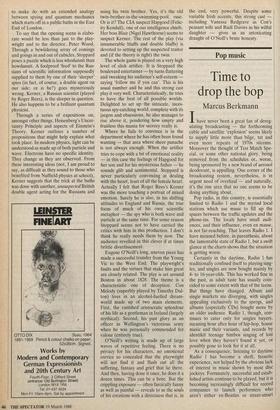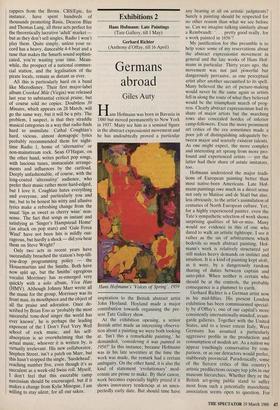Pop music
Time to drop the bop
Marcus Berkmann
Ihave never been a great fan of dereg- ulating broadcasting — the forthcoming cable and satellite 'explosion' seems likely to supply little more than bilge, tat and even more repeats of 1970s sitcoms. Moreover the thought of Test Match Spe- cial, or some other national glory, being removed from the schedules or, worse, being sponsored by a new brand of aerosol deodorant, is appalling. One corner of the broadcasting system, nevertheless, is in urgent need of overhaul — and naturally, it's the one area that no one seems to be doing anything about.
Pop radio, in this country, is essentially limited to Radio 1 and the myriad local stations which use music to fill up the spaces between the traffic updates and the phone-ins. The locals have small audi- ences, and their influence, even en masse, is not far-reaching. That leaves Radio 1. I have moaned before, in parenthesis, about the lamentable state of Radio 1, but a swift glance at the charts shows that the situation is getting worse.
Certainly in the daytime, Radio 1 has traditionally confined itself to playing sing- les, and singles are now bought mainly by 8- to 16-year-olds. This has worked fine in the past, as adult taste has usually coin- cided to some extent with that of the teens. But things have changed. Album and single markets are diverging, with singles appealing exclusively to the sprogs, and albums (especially CDs) bought more by an older audience. Radio 1, though, con- tinues to cater only for singles buyers, meaning hour after hour of hip-hop, house music and their variants, and records by identikit teenage bimbos singing of lost love when they haven't found it yet, or possibly gone to look for it at all.
As a consequence, listening to daytime Radio 1 has become a shrill, frenetic experience, not helped by the obvious lack of interest in music shown by most disc jockeys. Fortunately, successful and estab- lished artists continue to be played, but it is becoming increasingly difficult for record companies to launch performers who aren't either ex-Beatles or street-smart rappers from the Bronx. CBS/Epic, for instance, have spent hundreds of thousands promoting Basia, Deacon Blue and Thomas Lang, all three acts perfect for the theoretically lucrative `adult' market but as they don't sell singles, Radio 1 won't play them. Quite simply, unless your re- cord has a heavy, danceable 4-4 beat and a tune that makes the Smurfs sound sophisti- cated, you're wasting your time. Mean- while, the prospect of a national commer- cial station, and the legalisation of the pirate locals, remain as distant as ever.
All this is particularly hard on a band like Microdisney. Their first major-label album Crooked Mile (Virgin) was released last year to substantial critical praise, but of course sold no copies. Doubtless 39 Minutes, which appears on 28 March, will go the same way, but it will be a pity. The problem, I suspect, is that they straddle musical categories in a way that radio finds hard to assimilate. Cathal Coughlan's hard, vicious, almost demagogic lyrics probably recommended them for night- time Radio 1, home of `alternative' or non-mainstream rock. Sean. O'Hagan, on the other hand, writes perfect pop songs, with luscious tunes, immaculate arrange- ments and influences by the cartload. Deeply unfashionable, of course, with the long-coated `alternativp' audience, who prefer their music rather more hard-edged, but I love it. Coughlan hates everything and everyone, and particularly you and me, but to be honest his witty and allusive lyrics make a refreshing change from the usual `lips as sweet as cherry wine' non- sense. The fact that songs as instant and satisfying as `Singer's Hampstead Home' (an attack on pop stars) and `Gale Force Wind' have not been hits is mildly out- rageous, but hardly a shock — did you hear them on Steve Wright? Only two acts in recent years have successfully breached the station's bop-till- you-drop programming policy — the Housemartins and the Smiths. Both have now split up, but the Smiths' egregious vocalist Morrissey has re-emerged very quickly with a solo album, Viva Hate (HMV). Although Johnny Marr wrote all the music for the group, Morrissey was its front man, its mouthpiece and the object of all the praise and adoration. Once de- scribed by Brian Eno as `probably the most successful tone-deaf singer the world has ever known', he is perhaps the leading exponent of the I Don't Feel Very Well school of rock music, and his self- absorption is so overwhelming that the actual music, whoever it is written by, is virtually irrelevant. His new collaborator, Stephen Street, isn't a patch on Marr, but this hasn't stopped the single, `Suedehead', reaching number five, even though it's as succulent as a week-old Swiss roll. Myself, I don't feel that this execrable camp narcissism should be encouraged, but if it makes a change from Kylie Minogue, I am willing to stay silent, for all our sakes.

























































 Previous page
Previous page